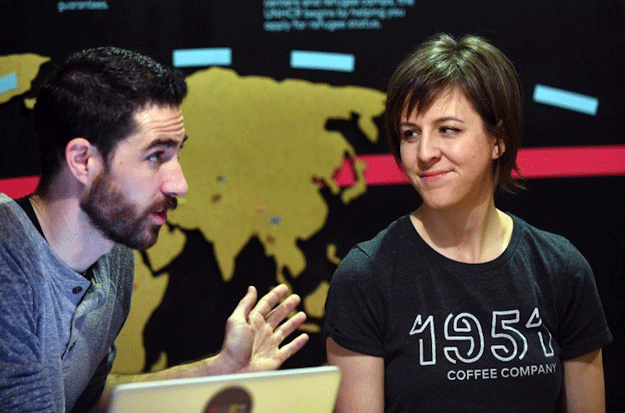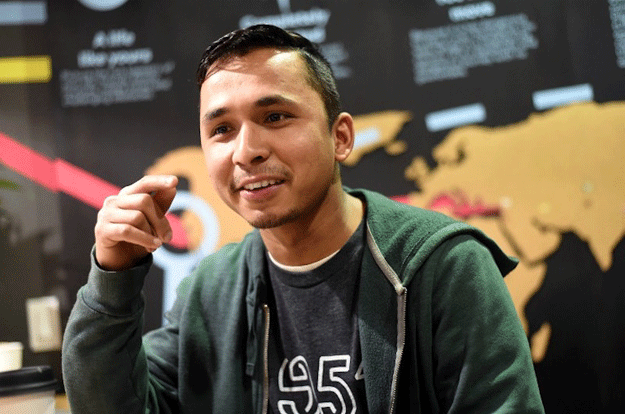BERKELEY, UNITED STATES: A coffee shop that recently opened in California is serving customers more than just steamy cups of latte or espresso, offering an additional true life lesson about an issue roiling the country – refugees.
Founded by Rachel Taber and Doug Hewitt, 1951 Coffee Shop is entirely staffed by refugees from various countries – including Syria, Bhutan, Afghanistan, Uganda and Eritrea – who are trying to build a new life after escaping wars or persecution.
The establishment –located in the university town of Berkeley – launched just days before President Donald Trump’s controversial executive order banning refugees and arrivals from seven Muslim-majority countries.

Co-founders Doug Hewitt and Rachel Taber speak to a reporter at 1951 Coffee Company in Berkeley, California, February 9, 2017.
It has struck a deep chord in the community, with people turning out in large numbers to offer support and sample the various brews.
“We didn’t plan the timing in the least but since we opened we’ve been slammed,” said Taber, 34, on a recent morning, as a steady stream of customers walked in.
“Normally coffee shops bleed money when they open but it’s been great for us to see the response from patrons.”
Taber and Hewitt – both of whom worked at the International Rescue Committee, which helps with refugee resettlements – said the outlet is a fitting way to raise consciousness and educate the public about an issue very much in the spotlight.
The name pays tribute to the 1951 UN convention relating to the status of refugees; the wood and charcoal interior includes one wall that recounts, in the form of a long mosaic, a refugee’s typical journey.
From those elements to the baristas behind the counter, the shop serves customers a stark lesson.
“I think the concept is great,” said Susan Yeazel, 57, who was on her second visit with a friend.
“There is so much negative politics and this is something small, productive and positive that I can do.”

Employee Meg Karki of Butan speaks to a reporter at 1951 Coffee Company in Berkeley, California, February 9, 2017.
Muriam Choudhery, 21, an undergraduate student in biology, said she drops in almost daily with fellow students as a way of making a political statement with every sip of coffee.
“As Muslims we have to help one another, especially nowadays,” she said, a black veil framing her face. “A lot of people aren’t educated about refugees. They don’t see them as people, they see them as terrorists.
“But when you have an environment like this, you humanise them.”
Every employee at 1951 – currently a crew of 10 – undergoes two weeks of training to learn the basics of coffee brewing, the different types of coffee and customer service etiquette.
The idea is to offer the refugees the possibility of a career down the line in the coffee industry, in their bid to become self-sufficient in their new home country.
“Every major roaster, distributor, packager has an office in the Bay Area and it’s an industry that does not require normally expensive certification or education to access,” Taber said.
Added to that, Hewitt said, is the large number of trendy coffee shops flourishing in the Bay Area – a bastion of liberal politics – and elsewhere across the country, which could potentially employ someone already trained.
“We are hoping that for those that may not have a breadth of education or a professional career and are looking to restart, that this will inspire them and that they can make a fabulous career out of it,” he said.
Several of the employees said 1951 has offered them new hope at a time when they find themselves at the centre of a heated debate as they start anew.
“This is like a refuge for me,” said Nicolas Webaza, 23, a refugee from Uganda who arrived in Berkeley three months ago. “I feel comfortable here. It’s more than a place of peace, it’s my family.
“We all understand each other here.”
Rana, who fled Syria with her parents and three siblings and who arrived in the US two years ago, said it was bewildering to see the backlash from the Trump administration against refugees.
“After the executive order came down, I was very scared,” said the 18-year-old who aspires to be a doctor, who asked that her real name not be used.
“If America doesn’t want us, where are we to go?”
The young woman, whose father owned a clothing factory that employed 50 people before the war broke out in Syria, said the outpouring of support from customers at 1951 has been reassuring.
“The community here is very tolerant,” she said. “And they understand that we are people, like them.”







